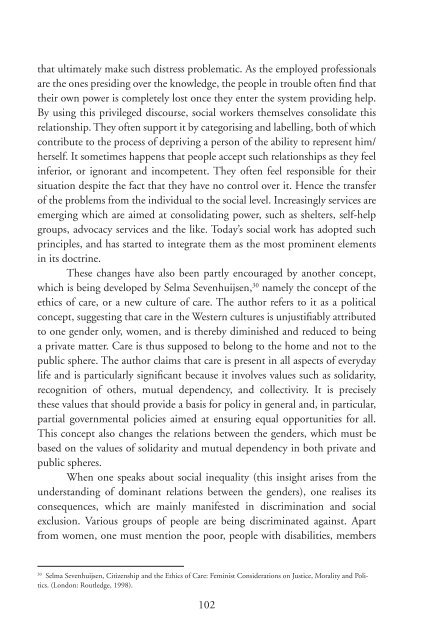Teaching Gender in Social Work - MailChimp
Teaching Gender in Social Work - MailChimp
Teaching Gender in Social Work - MailChimp
You also want an ePaper? Increase the reach of your titles
YUMPU automatically turns print PDFs into web optimized ePapers that Google loves.
that ultimately make such distress problematic. As the employed professionals<br />
are the ones presid<strong>in</strong>g over the knowledge, the people <strong>in</strong> trouble often f<strong>in</strong>d that<br />
their own power is completely lost once they enter the system provid<strong>in</strong>g help.<br />
By us<strong>in</strong>g this privileged discourse, social workers themselves consolidate this<br />
relationship. They often support it by categoris<strong>in</strong>g and labell<strong>in</strong>g, both of which<br />
contribute to the process of depriv<strong>in</strong>g a person of the ability to represent him/<br />
herself. It sometimes happens that people accept such relationships as they feel<br />
<strong>in</strong>ferior, or ignorant and <strong>in</strong>competent. They often feel responsible for their<br />
situation despite the fact that they have no control over it. Hence the transfer<br />
of the problems from the <strong>in</strong>dividual to the social level. Increas<strong>in</strong>gly services are<br />
emerg<strong>in</strong>g which are aimed at consolidat<strong>in</strong>g power, such as shelters, self-help<br />
groups, advocacy services and the like. Today’s social work has adopted such<br />
pr<strong>in</strong>ciples, and has started to <strong>in</strong>tegrate them as the most prom<strong>in</strong>ent elements<br />
<strong>in</strong> its doctr<strong>in</strong>e.<br />
These changes have also been partly encouraged by another concept,<br />
which is be<strong>in</strong>g developed by Selma Sevenhuijsen, 30 namely the concept of the<br />
ethics of care, or a new culture of care. The author refers to it as a political<br />
concept, suggest<strong>in</strong>g that care <strong>in</strong> the Western cultures is unjustifiably attributed<br />
to one gender only, women, and is thereby dim<strong>in</strong>ished and reduced to be<strong>in</strong>g<br />
a private matter. Care is thus supposed to belong to the home and not to the<br />
public sphere. The author claims that care is present <strong>in</strong> all aspects of everyday<br />
life and is particularly significant because it <strong>in</strong>volves values such as solidarity,<br />
recognition of others, mutual dependency, and collectivity. It is precisely<br />
these values that should provide a basis for policy <strong>in</strong> general and, <strong>in</strong> particular,<br />
partial governmental policies aimed at ensur<strong>in</strong>g equal opportunities for all.<br />
This concept also changes the relations between the genders, which must be<br />
based on the values of solidarity and mutual dependency <strong>in</strong> both private and<br />
public spheres.<br />
When one speaks about social <strong>in</strong>equality (this <strong>in</strong>sight arises from the<br />
understand<strong>in</strong>g of dom<strong>in</strong>ant relations between the genders), one realises its<br />
consequences, which are ma<strong>in</strong>ly manifested <strong>in</strong> discrim<strong>in</strong>ation and social<br />
exclusion. Various groups of people are be<strong>in</strong>g discrim<strong>in</strong>ated aga<strong>in</strong>st. Apart<br />
from women, one must mention the poor, people with disabilities, members<br />
30<br />
Selma Sevenhuijsen, Citizenship and the Ethics of Care: Fem<strong>in</strong>ist Considerations on Justice, Morality and Politics.<br />
(London: Routledge, 1998).<br />
102

















